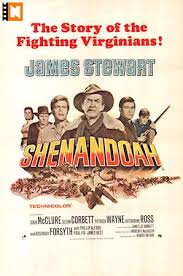
SHENANDOAH
US, 1965, 105 minutes, Colour.
James Stewart, Doug Mc Clure. Glen Corbett, Rosemary Forsythe, Katharine Ross.
Directed by Andrew V. Mc Laglan.
Shenandoah is an enjoyable western, directed by Andrew V Mc Laglen, director of many westerns which starred John Wayne or James Stewart. This is a strong James Stewart vehicle. He dominates as the patriarch of the family in Virginia during the civil war. The atmosphere of the war is emphasized and the difficulties of remaining neutral. This is a point of interest in the screenplay which was filmed in 1965 - the reference to an American involvement in Vietnam and the subsequent commitment and argument for commitment of American forces are relevant. The screenplay author, James Lee Barrett, authored John Wayne's The Green Beret. The film features young players, many of whom were to make their mark in the late sixties and seventies - Doug Mc Clure and Katherine Ross. The film is a piece of Americana - Stewart propounding the basic American values.
1 The impact of the film as western, civil war story, picture of an American family of the 19th century? The appeal of the human drama, the action, the themes?
2 The presentation of the civil wars and it’s issues? Virginia and the Anderson family's non-involvement? The action sequences, the war - skirmishes, battles, the weary troops, the hungry refugees, escapers, the prison train? Colour photography, atmosphere, score and the use of traditional melodies.
3 The film as a James Stewart vehicle: his screen persona over the decades, his portrait of a patriarch, the father and his relationship to his family, his putting forward the American heritage and values, proposing individual initiative, non-involvement in other peoples wars, the role of government and war, pride in family, pride in hard work, a stance against slaves, a family relationships and traditional values, death, anger and pain? The relevance for these themes to America and Vietnam at the time of the making of the film?
4 The South and its values: the slaves - as represented by Abernathy? The discussion at the table about involvement, fighting for slaves? The refusal of the horses? The closeness of the war? Boys' capture? The family going to find him? The prisons, winners and conquered, the prison train?
5 The Anderson family: Charlie as the patriarch, his visits to his wife's grave, bringing up his family according to her principles, going to church, the strong family of sons, their work together, talk at the table, Jenny and her place in the family, the courtship of Sam and his being welcomed, James and Annie and the birth of Charlotte? Boy and the special affection because of his mother's death? The meal discussions, the humour of the church sequences, fighting for right, the family searching for Boy? The grief at so many deaths? The final sequences in the cemetery?
6 Jenny and Sam and proper courting, the humour of Sam asking for Jenny's hand, the wedding and his having to go off immediately to war, meeting at the prison train, the father providing for their belated honeymoon? Their future and James and Anne's daughter - the ugliness of James's death offering hospitality, and the scavengers?
7 The boys and their work, fighting for their father? Jacob and his wanting to go to war and the irony of the accidental death? Boy and his having these confederate caps, his usefulness, naivety? The pathos of his capture - and his negro friend being allowed to go free? His wandering right down the road? The capture, the escape, the battle-lines with the cow in the middle? Death all around him? The friend who organized the escape dying in his arms? The black man rescuing him? His being saved and limping into the church?
8 The young boy who shot Jacob? His age? Charlie Anderson's strong speech putting a curse on him? His tears? The Northern General with the sixteen year old son? The futility of war and the sadness of death?
9 The picture of domestic pioneers? Isolated, self-sufficient, the closeness of the war and their being involved? The picture of war with its skirmishes, hungry soldiers, depots and trains - the impact of the destruction of the prison train despite the driver's plea? The cruel scavengers? The irony of the cow wandering on the battle field, the rodeo atmosphere and the soldiers cheering and then killing one another?
10 A glimpse of the west and its style, the impact of the civil war, American values?